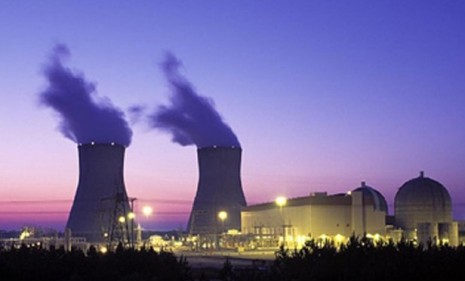Could thorium make nuclear power safe?
The world can have cheap nuclear power without Japan-level risks by swapping thorium for uranium, some scientists claim. Is that too good to be true?

A free daily email with the biggest news stories of the day – and the best features from TheWeek.com
You are now subscribed
Your newsletter sign-up was successful
Japan's escalating disaster at its Fukushima reactors is putting a damper on the nuclear power industry, just as nuclear energy was starting to bask in a post-Chernobyl glow. But instead of giving up on nuclear power, say an "almost cult-like" group of nuclear scientists, we should just switch from uranium-based reactors to ones fueled by cheaper, safer thorium. What is this miracle metal — and could it really bring us safe nuclear power?
What is thorium?
A silvery metal (symbol: Th; atomic number: 90) close to uranium on the periodic table of elements, with just two fewer protons. It was discovered in 1828, and is named after the Norse god of thunder. As an added bonus, it's "almost as common as dirt," says Antonia Zerbisias in The Toronto Star.
The Week
Escape your echo chamber. Get the facts behind the news, plus analysis from multiple perspectives.

Sign up for The Week's Free Newsletters
From our morning news briefing to a weekly Good News Newsletter, get the best of The Week delivered directly to your inbox.
From our morning news briefing to a weekly Good News Newsletter, get the best of The Week delivered directly to your inbox.
Why are fans so excited about it?
Thorium-fueled reactors are supposed to be much safer than uranium-powered ones, use far less material (1 metric ton of thorium gets as much bang as 200 metric tons of uranium, or 3.5 million metric tons of coal), produce waste that is toxic for a shorter period of time (300 years vs. uranium's tens of thousands of years), and is hard to weaponize. In fact, thorium can even feed off of toxic plutonium waste to produce energy. And because the biggest cost in nuclear power is safety, and thorium reactors can't melt down, argues Michael Anissimov in Accelerating Future, they will eventually be much cheaper, too.
How cheap would it be?
If a town of 1,000 bought a 1-megawatt thorium reactor for $250,000, using 20 kilograms of thorium a year with almost no oversight, every family could pay as little as $0.40 a year for all their electricity, Anissimov predicts. And small reactors like that aren't just potentially cost-effective, he says; they're much safer, too.
A free daily email with the biggest news stories of the day – and the best features from TheWeek.com
Where can we get thorium?
Lots of places. The U.S. has an estimated 440,000 metric tons, Australia and India have about 300,000 metric tons, and Canada has 100,000 metric tons. Until recently, U.S. and Australian mining companies threw it away as a useless byproduct. There is enough thorium to power the earth for about 1,000 years, boosters say, versus an estimated 80 years' worth of uranium.
If thorium's so great, why do we use uranium?
To make a "long story very short and simple," says The Star's Antonia Zerbisias, weapons and nuclear subs. U.S. researchers were developing both uranium-based and thorium-based reactors in the Cold War 1950s, but thorium doesn't create weapons-grade plutonium as a byproduct. Plus, nuclear submarines could be designed more easily and quickly around uranium-based light-water reactors.
OK, but there must be a downside to thorium, right?
Indeed. First, it will take a lot of money to develop a new generation of thorium-fueled reactors — America's has been dormant for half a century. China is taking the lead in picking up the thread, building on plans developed and abandoned in Europe. And part of the reason Europe dropped the research, according to critics, is pressure from France's uranium-based nuclear power industry. Others just think the whole idea is being oversold. If "an endless, too-cheap-to-meter source of clean, benign, what-could-possibly-go-wrong energy" sounds too good to be true, says nuclear analyst Norm Rubin, it's because it is.
Sources: Toronto Star, Telegraph, EconProph, Accelerating Future
-
 The Olympic timekeepers keeping the Games on track
The Olympic timekeepers keeping the Games on trackUnder the Radar Swiss watchmaking giant Omega has been at the finish line of every Olympic Games for nearly 100 years
-
 Will increasing tensions with Iran boil over into war?
Will increasing tensions with Iran boil over into war?Today’s Big Question President Donald Trump has recently been threatening the country
-
 Corruption: The spy sheikh and the president
Corruption: The spy sheikh and the presidentFeature Trump is at the center of another scandal